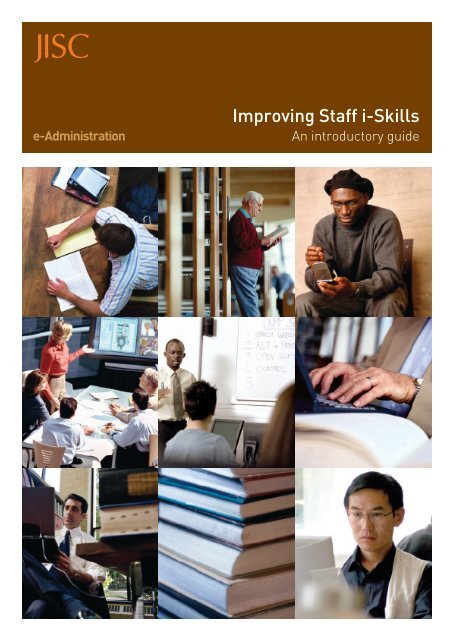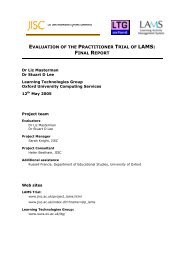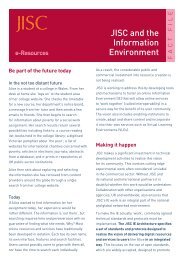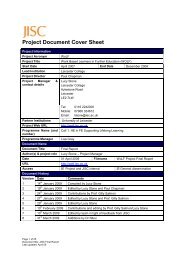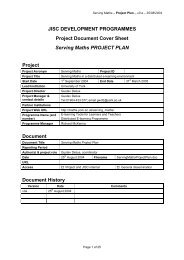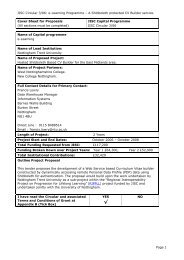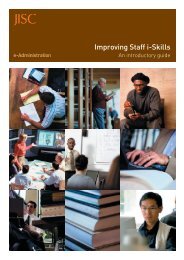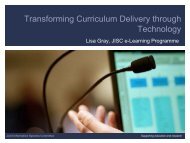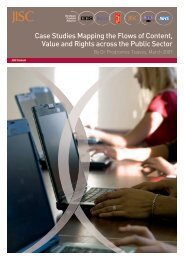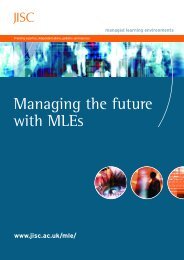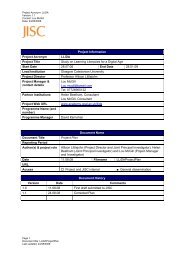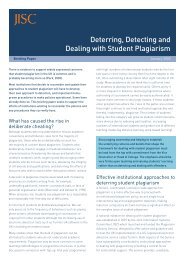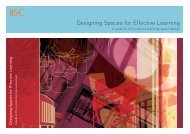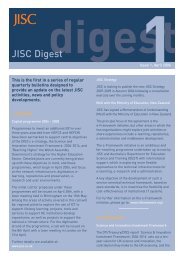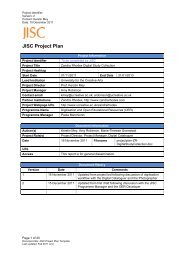Improving Staff i-Skills - Jisc
Improving Staff i-Skills - Jisc
Improving Staff i-Skills - Jisc
You also want an ePaper? Increase the reach of your titles
YUMPU automatically turns print PDFs into web optimized ePapers that Google loves.
<strong>Improving</strong> <strong>Staff</strong> i-<strong>Skills</strong><br />
An introductory guide
There is a pressing need for further and higher education institutions to promote and improve staff<br />
i-skills, but this area is under-researched and lacking in guidelines for practitioners.<br />
This document has been compiled for all those with a responsibility for developing staff in further and<br />
higher education. It will help you to:<br />
■ Define i-skills<br />
■ Understand why they are important for individuals and institutions<br />
■ Recognise i-skills in context<br />
■ Make a start on an i-skills staff development plan<br />
■ Develop ideas to help you deliver i-skills provision for your own institution<br />
<strong>Improving</strong> <strong>Staff</strong> i-<strong>Skills</strong> 2005: Compiled for JISC by Gill Joy, ESYS plc and Paula Taylor, HE Consulting<br />
This document has been produced and edited by Dicky Maidment-Otlet and the JISC Communications Team – www.jisc.ac.uk/publications<br />
2<br />
<strong>Improving</strong> <strong>Staff</strong> i-<strong>Skills</strong>
Defining i-skills<br />
What’s it all about?<br />
Working in a rapidly growing and complex digital<br />
environment has increased our dependency on information.<br />
But there is increasing evidence that our information skills<br />
are not keeping pace in any systematic fashion. We all need<br />
help to develop the techniques we use, often unconsciously,<br />
to handle information in our daily lives – our i-skills.<br />
You may not have heard the term ‘i-skills’ up to now, but<br />
probably terms such as information skills, e-literacy,<br />
information literacy, knowledge management and research<br />
skills are more familiar. This guide uses the term i-skills to<br />
encompass all of these.<br />
i-<strong>Skills</strong> are defined as: the ability to identify, assess, retrieve,<br />
evaluate, adapt, organise and communicate information<br />
within an iterative context of review and reflection<br />
But what does this mean in practice and how can staff<br />
development help?<br />
The i-skills cycle<br />
i-<strong>Skills</strong> are needed at every stage of the information cycle<br />
and you may have a varying level of involvement at different<br />
stages, depending on your role. In some areas you may be<br />
required to have an expert level of i-skills. In others you will<br />
only need a working knowledge and may depend on other<br />
colleagues for specialist help.<br />
Communicates Information<br />
■<br />
■<br />
■<br />
Reviews the Process<br />
reflects whether the original<br />
information need has been<br />
met<br />
repeats process if necessary<br />
understands process &<br />
reuses in other contexts<br />
(lifelong learning)<br />
■<br />
■<br />
■<br />
Identifies an Information<br />
Need<br />
determines the nature &<br />
extent of the need<br />
confers with others eg peers,<br />
colleagues<br />
is aware of range of info<br />
resources<br />
■<br />
■<br />
■<br />
■<br />
■<br />
disseminates information<br />
effectively to others<br />
uses appropriate methods<br />
Organises Information<br />
keeps accurate records of<br />
sources and references<br />
cites references using<br />
appropriate method<br />
is aware of issues of<br />
copyright & plagiarism<br />
■<br />
■<br />
■<br />
Adapts Information<br />
Reflect<br />
interprets information found<br />
to match information need<br />
creates new knowledge for<br />
self & others<br />
recognises accumulation of<br />
new knowledge<br />
i-skills<br />
cycle<br />
Revise<br />
■<br />
■<br />
■<br />
Review<br />
Evaluates Information Critically<br />
assesses quality, quantity &<br />
relevance of retrieved information<br />
revises search strategy and repeats<br />
as necessary<br />
assesses quality of information<br />
retrieved for bias, currency &<br />
authority<br />
■<br />
■<br />
Assesses the Information Need<br />
■<br />
■<br />
■<br />
determines how to approach the<br />
information need<br />
formulates keywords & search<br />
strategies<br />
selects and evaluates<br />
information sources<br />
Retrieves Information<br />
interrogates a range of<br />
sources<br />
selects, reviews, retains &<br />
discards results as<br />
necessary<br />
Adapted from original Big Blue model<br />
An introductory guide 3
For those promoting staff i-skills, it is not so much the<br />
choice of terms used that is important, but understanding<br />
how the skills in this cycle should be applied in the context<br />
of someone’s work role.<br />
The table below gives some scenarios of where and how<br />
i-skills might be used. You should bear in mind that the<br />
steps in the process are not necessarily discrete nor always<br />
carried out in sequence. They can be applied in many<br />
different contexts.<br />
Identify/assess information need<br />
Planning any new information-related work – a presentation, report or other publication – requires identifying and assessing<br />
information needs. Alternatively, it could be a case of recognising that existing information needs to be updated, added to or<br />
improved, or adapted for a new purpose, dissemination route or medium.<br />
Locate/retrieve<br />
Information can be found in many places, and there are efficient ways to both find and retrieve it - maybe on a website, or via<br />
a search engine. Would you know which browser to use for what purpose, and be able to search efficiently and effectively?<br />
Once the information is located, it may need to be ordered over the Internet or printed – are these processes understood? If<br />
someone is assisting the search, have you briefed them properly about what you are looking for?<br />
Assess/evaluate<br />
If you’re the end customer for the information, you should be in a good position to do this step yourself. If others are involved,<br />
however, do they fully understand the aims and criteria they need to work to? Do you have the skills necessary to evaluate<br />
information from the web as opposed to traditional academic or business sources?<br />
Adapt/create/use<br />
Do you know how to display information effectively, in the most relevant way, and using a range of media, including<br />
electronic? If others prepare this step on your behalf, do you know enough about the capabilities of different media to guide<br />
the process, and assess the outcome?<br />
Organise<br />
Do you (or others in your team) know how to reference sources and manipulate data? Are good records kept of sources<br />
used, and information gathered, for future reference? Do you know how to keep your email files well-organised and free of<br />
unwanted data?<br />
Communicate<br />
How are your presentation skills? What about in an electronic environment? Are you able to adapt the presentation to suit<br />
another environment? Do you know how to upload information onto a Virtual Learning Environment (VLE) for dissemination<br />
or sharing with others?<br />
Reflect/review<br />
As with all processes, the last step is to review and reflect on the outcomes, the effectiveness and efficiency of the process,<br />
and whether any improvements or additional information are needed.<br />
4<br />
<strong>Improving</strong> <strong>Staff</strong> i-<strong>Skills</strong>
Adding up the benefits<br />
of better i-skills<br />
Taking steps to improve i-skills has not always been a<br />
priority for staff in further and higher education (FE/HE),<br />
and this can present some hurdles for staff development<br />
teams. It is therefore helpful to understand the benefits of<br />
improving i-skills for different target audiences in order to<br />
promote support activities effectively.<br />
In order to achieve the benefits outlined, a greater<br />
understanding is required of the role that i-skills should play<br />
in creating cohesive and sensible approaches to information<br />
management. Some members of your institution may already<br />
be using i-skills – it could be a matter of harnessing these skills<br />
to greater effect either within their own areas, or collaboratively<br />
across the institution. The table below gives examples of the<br />
types of contribution and collaboration that can be made:<br />
Is this how i-skills are practised in your institution?<br />
Benefits for the individual<br />
member of staff:<br />
■ Greater independence, less<br />
reliance on others<br />
■ Improved access/connection to<br />
information to aid the process<br />
of research<br />
■ Enhanced professional<br />
development in the area of<br />
research and information skills<br />
■ Time saving<br />
■ Improved quality of information<br />
outputs<br />
■ More effective sharing of<br />
information<br />
Benefits for the institution:<br />
■ More effective use of<br />
information across the<br />
institution<br />
– Duplication reduced<br />
– Improved information flow<br />
– Improved use of existing<br />
resources<br />
– Improved return on<br />
investment<br />
■ Improved research capability<br />
■ Better take-up and integration of<br />
resources into e-learning and<br />
e-research environments<br />
■ Enhanced market profile and<br />
reputation<br />
■ Motivated staff<br />
In turn, the influence on<br />
STUDENTS could result in:<br />
■ Enhanced employability<br />
– Transferability of i-skills to<br />
work-based context<br />
■ Improved research skills<br />
– Ability to retrieve information<br />
and interpret it using a<br />
variety of media and output<br />
formats<br />
■ Improved confidence and ability<br />
to learn independently<br />
■ Increased ability to think<br />
critically, interpret information<br />
and make informed judgements<br />
i-<strong>Skills</strong> in context<br />
Library/Learning Resources Admin/Support <strong>Staff</strong> Curriculum/Academic <strong>Staff</strong><br />
■ Specialist knowledge in some<br />
areas, eg sourcing, filtering and<br />
organising information<br />
■ Supporting curriculum/academic<br />
information needs<br />
■ Advising and/or training others<br />
in managing information and<br />
technology<br />
■ Supporting curriculum/academic<br />
or learning resources function with<br />
information and organisation<br />
■ Developing presentations of<br />
information against a provided brief<br />
■ Specialist knowledge for evaluation<br />
and analysis of information in own<br />
subject area<br />
■ Supporting others by providing a<br />
clear brief for those assisting in an<br />
information process<br />
■ Delivering/disseminating<br />
information to suit a specific<br />
audience<br />
An introductory guide 5
How does your institution<br />
measure up?<br />
Looking at this i-skills analysis, do you recognise your<br />
institution? Does it foster its areas of strength, or try to live<br />
with the weaknesses? And what are the implications?<br />
It has the opportunity to develop:<br />
An institution with good i-skills will:<br />
■ Manage information efficiently and effectively<br />
■ Communicate appropriately internally and<br />
externally<br />
■ Keep individuals up to date with new technologies<br />
■ Use information and technology for better<br />
organisation of their work and time<br />
■ Use i-skills and associated processes as a vehicle<br />
to improve quality<br />
■ A shared approach to managing information<br />
processes, as required by the Common Inspection<br />
Framework<br />
■ A sound foundation for achieving and/or<br />
maintaining high standards in research and<br />
teaching/learning<br />
■ A better understanding and use of associated<br />
technologies, such as VLEs<br />
■ A reputation with students for having a motivated,<br />
progressive approach<br />
■ A healthy mix of independence and<br />
interdependency across the institution<br />
■ Effective use of resources (better return on<br />
investment)<br />
■ Increased use of facilities and services, such as<br />
remote access to institution's Intranet<br />
An institution with poor or<br />
patchy i-skills is likely to:<br />
■ Duplicate effort<br />
■ Miss important information<br />
■ Suffer from confused communication or<br />
misunderstood requirements, instructions and/or<br />
criteria<br />
■ Have a poor understanding of own and others'<br />
roles in information processing<br />
■ Demonstrate a lack of awareness or<br />
understanding of their role in helping to achieve<br />
good communication and keeping up to date with<br />
information<br />
■ Have 'no time' to spend on keeping up with new<br />
ideas or attending training<br />
It is at risk of:<br />
■ Demotivating those with good or specialist i-skills<br />
■ Falling behind its competitors due to insufficient<br />
knowledge and expertise of up-to-date technology<br />
and thinking<br />
■ Developing/maintaining the 'silo' effect, where there<br />
is little sharing or understanding across the<br />
institution of the 'big picture' and their role within it<br />
■ Failing to benefit from cross-pollination of skills<br />
and information between departments<br />
■ Inefficient/insufficient use of information<br />
resources and technologies<br />
■ Losing (motivation of) students interested in<br />
becoming proficient in i-skills and associated<br />
technologies<br />
■ Vulnerability to misuse of information and<br />
technology (such as viruses, email, spam,<br />
Intellectual Property Rights etc) through lack of<br />
understanding<br />
6<br />
<strong>Improving</strong> <strong>Staff</strong> i-<strong>Skills</strong>
Planning your staff i-skills<br />
programme<br />
In this section you will find ideas for moving i-skills into<br />
the mainstream of your institution’s staff development<br />
programmes.<br />
Advice and suggestions are aimed at everyone involved in<br />
i-skills delivery – staff developers, senior management,<br />
library and information services teams, teaching and<br />
learning support and so on.<br />
Current state of play<br />
i-<strong>Skills</strong> training for students is widely available across<br />
FE/HE. The provision for staff in institutions appears to be<br />
fragmented, however, with few structured programmes in<br />
place and patchy take-up. JISC commissioned a study in<br />
2003 to look at this and the findings confirmed the need for<br />
more support in this area:<br />
■ Institutions and individuals are not sure what i-skills<br />
are all about, so do not recognise that there is a need to<br />
improve them<br />
■ Only in a few cases are i-skills part of an institution-wide<br />
strategy for development of staff core skills<br />
■ i-skills are not explicitly recognised in professional<br />
development frameworks or appraisals<br />
■ No examples were found of i-skills staff development<br />
provision for non-academic staff<br />
■ Patchy take-up of i-skills training is a widespread problem<br />
■ Many academic staff are getting by, while students’<br />
expectations are increasing<br />
■ Most i-skills staff development is provided by library<br />
staff, sometimes in collaboration with <strong>Staff</strong> Development<br />
and IT/IS teams<br />
■ Provision is often via ad hoc sessions rather than<br />
structured programmes and tends to take a ‘one size fits<br />
all’ approach<br />
■ Subject-focused provision – i-skills in context – works<br />
best<br />
■ BUT, once people take the first step in i-skills training,<br />
they come back for more<br />
What’s the objective?<br />
There are few roles in FE/HE where i-skills do not apply, so<br />
staff development in this area should be planned, supported<br />
and delivered as part of your institution’s strategic<br />
framework. <strong>Improving</strong> i-skills can make a difference to<br />
the performance of the whole institution as well as that of<br />
individuals, so staff development provision needs to be part<br />
of the mainstream rather than a ‘library thing’.<br />
Senior<br />
management<br />
<strong>Staff</strong><br />
developers<br />
Integrated<br />
Delivery Team<br />
Objectives for HE/FE<br />
■ i-<strong>Skills</strong> institutional strategy<br />
■ Professional recognition<br />
■ Pervasive across institution<br />
■ More innovative, tailored<br />
provision<br />
Library/<br />
info services<br />
Teaching<br />
& learning<br />
support<br />
ICT/ILT<br />
teams<br />
Recognition within your institution of the contribution i-skills<br />
can make to professional development is essential if staff<br />
are to be motivated to spend time on i-skills training.<br />
For i-skills to be pervasive across the institution, everyone<br />
needs to be involved in an appropriate way:<br />
■ Senior management<br />
■ <strong>Staff</strong> developers<br />
■ Library & information services<br />
■ Teaching and Learning support<br />
■ Academic departments<br />
■ Administration teams<br />
An introductory guide 7
The first step in addressing this and ensuring strong buy-in across<br />
your institutions is to develop a clear plan for your i-skills training,<br />
involving all relevant stakeholders.<br />
Including specific i-skills objectives within your institution’s<br />
strategic plans (information, ICT, HR, teaching and learning) is<br />
an important first step and needs senior management support.<br />
What should you do next ? Read on…<br />
Getting started on your i-<strong>Skills</strong> <strong>Staff</strong><br />
Development Plan<br />
Feedback from surveys of current i-skills staff development<br />
provision indicates that there is a lack of strategic planning in<br />
this area. This means that ownership for i-skills development<br />
is fragmented across several different departments and<br />
central services. More importantly, i-skills are not explicitly<br />
recognised in FE and HE institutions’ strategic plans.<br />
The first step in addressing this and ensuring strong buy-in<br />
across your institution is to develop a clear plan for your<br />
i-skills training, involving all relevant stakeholders.<br />
So what needs to be covered in the plan?<br />
The outline plan opposite may be a useful starting point<br />
for developing a strategic i-skills plan. For practical<br />
suggestions to help you develop, deliver and promote staff<br />
i-skills, why not take a look at the insert in this document<br />
entitled Starter for 10. If the insert is missing or you would<br />
like further copies, please visit<br />
www.jisc.ac.uk/cpdresources.<br />
The i-skills challenge<br />
Recognition<br />
Consensus<br />
Commitment<br />
Collaboration<br />
i-<strong>Skills</strong> <strong>Staff</strong> Development Plan Outline<br />
Objectives<br />
■ What are you trying to achieve?<br />
■ Set measurable targets<br />
■ Link these explicitly to your institution’s ICT, HR and<br />
staff development goals<br />
Needs<br />
■ Identify the needs of all target audiences, academic<br />
and non-academic<br />
■ How are they inter-related?<br />
Action plan<br />
■ What actions will you take to meet these needs?<br />
■ What content is required?<br />
■ How will staff development be delivered (where,<br />
formats, timing)?<br />
■ Can you tie in the provision with other activities that<br />
staff are already attending?<br />
■ Are there external agencies with which you wish to<br />
collaborate?<br />
Communications<br />
■ How will you promote provision effectively to each<br />
target audience?<br />
■ Have you made clear the benefits of improving<br />
i-skills?<br />
Measuring impact<br />
■ How do you plan to measure the impact of your<br />
provision?<br />
■ Do you have baseline information on i-skills capability<br />
prior to the training?<br />
■ What can you do to assess the longer term benefits of<br />
your provision on working practice and culture?<br />
Schedule<br />
■ Do you have a detailed schedule for developing and<br />
rolling out your plan?<br />
■ Are all key people available?<br />
Resources<br />
■ Have you involved relevant senior staff to ensure their<br />
support?<br />
■ Have you included a range of staff types in your<br />
planning group?<br />
■ Do you have a central contact person as a focal point<br />
for promoting staff i-skills?<br />
8<br />
<strong>Improving</strong> <strong>Staff</strong> i-<strong>Skills</strong>
Align your programme with drivers for change<br />
New staff development initiatives in the i-skills area will<br />
have more chance of success if they are aligned with drivers<br />
for change in institutions. There are several types of driver<br />
that can be influential for i-skills programmes and you will<br />
want to tap into those that have most relevance for your<br />
institution.<br />
Types of staff development driver<br />
External<br />
Drivers<br />
Professional and Role Drivers<br />
Does your programme appeal to those seeking professional<br />
development? Can you offer accreditation or recognition by<br />
professional bodies for different roles?<br />
User and Customer Drivers<br />
Student expectations of staff i-skills are increasing – can<br />
this be used to help promote your programme?<br />
Personal Drivers<br />
What personal issues are driving i-skills development and<br />
are you addressing these in your programme?<br />
Layers of drivers<br />
Institutional<br />
Drivers<br />
Key<br />
Drivers<br />
Infrastructural<br />
Drivers<br />
External<br />
Institutional<br />
Infrastructural<br />
User/customer<br />
Role/professional<br />
Professional<br />
and Role<br />
Drivers<br />
Personal<br />
Drivers<br />
User and<br />
Customer<br />
Drivers<br />
Personal<br />
External Drivers<br />
Can you link your programme to institutional performance in<br />
the RAE or QA reviews?<br />
Institutional Drivers<br />
Can you demonstrate that it will contribute to improved<br />
performance and processes? Will it promote consideration<br />
of i-skills in recruitment and staff appraisal processes?<br />
Infrastructural Drivers<br />
Is it clear how i-skills can be integrated in core e-learning<br />
and ICT processes within the institution?<br />
This second diagram indicates that it is possible to start at<br />
any point in order to stimulate interest and demand. But<br />
you should be aware of the other layers of drivers that may<br />
come into play, and that may need to be managed to ensure<br />
that they support rather than inhibit achievement of the<br />
objective.<br />
An introductory guide 9
Working with other organisations<br />
A number of support organisations and initiatives in FE and<br />
HE have already made progress in promoting staff i-skills<br />
and they can provide useful input to any programmes you<br />
are planning for your institution.<br />
Netskills runs workshops on ICT skills, e-learning and<br />
i-skills for FE and HE. <strong>Staff</strong> developers and library teams<br />
can also license Netskills materials for use on in-house<br />
training courses. Netskills has recently been involved in a<br />
UK-wide programme of advance information skills training<br />
for staff in public libraries.<br />
The Higher Education Academy (HEA), formerly known as<br />
the Learning and Teaching Support Network, comprises a<br />
Generic Centre and 24 subject based Centres. A number of<br />
staff i-skills support services have been developed within its<br />
subject network:<br />
■ The LawPaths project aims to support effective use of<br />
new, digital legal sources<br />
■ LTSN Information and Computer Sciences has<br />
undertaken a review of e-literacy packages for students,<br />
which may provide useful pointers for staff i-skills<br />
provision<br />
Regional Support Centres offer a varied programme of staff<br />
development events and courses for FE institutions and can<br />
be a useful partner in developing your i-skills programme.<br />
Some centres are also developing forums that aim to<br />
address the staff i-skills challenge.<br />
The Resource Discovery Network Virtual Training Suite<br />
(RDN-VTS) is a set of free, online tutorials designed to help<br />
students, lecturers and researchers improve their Internet<br />
literacy and IT skills. Tutorials have been developed for<br />
different HE disciplines.<br />
■ The Supporting New Academic <strong>Staff</strong> (SNAS) Programme<br />
is developing a range of materials and training events to<br />
support selection of teaching resources<br />
10<br />
<strong>Improving</strong> <strong>Staff</strong> i-<strong>Skills</strong>
Further<br />
information<br />
on staff i-skills<br />
i-skills studies<br />
Other publications in this series<br />
Big Blue<br />
connect<br />
<strong>Staff</strong><br />
Development<br />
Provision<br />
Study<br />
Drivers<br />
for <strong>Staff</strong><br />
Development<br />
Study<br />
Investigation into the information skills<br />
sets of staff working in FE and HE,<br />
looking at competencies within different<br />
roles and developing a map of i-skills.<br />
Manchester Metropolitan University,<br />
December 2003<br />
www.library.mmu.ac.uk/bbconnect<br />
Study to provide an overview of existing<br />
staff development provision for i-skills<br />
in FE and HE. Reviewed provision by<br />
institutions and support organisations<br />
and assessed areas of strengths and<br />
weaknesses. ESYS plc, December 2003<br />
www.jisc.ac.uk/cpdresources<br />
Study to identify the drivers for staff<br />
development in HE and FE and explores<br />
the implications for development of staff<br />
i-skills. HE Consulting, December 2003<br />
www.jisc.ac.uk/cpdresources<br />
This publication has two sister publications. Other<br />
publications relating to this area of work are also<br />
available:<br />
Please visit www.jisc.ac.uk/cpdresources<br />
JISC <strong>Staff</strong> Information <strong>Skills</strong> Set<br />
Programme<br />
The Joint Information Systems Committee (JISC) supports<br />
Further and Higher Education in the use of information and<br />
communications technology. The <strong>Staff</strong> Information <strong>Skills</strong> Set<br />
project (SISS) has been established to take forwards JISC’s<br />
work in the area of i-skills.<br />
Contact:<br />
Malcolm Batchelor<br />
Sector Support: Engagement Programme Manager<br />
JISC Executive<br />
Tel: 0115 846 6054<br />
Fax: 0115 951 4791<br />
Email: m.batchelor@jisc.ac.uk<br />
Web: www.jisc.ac.uk/cpdresources<br />
An introductory guide 11
Useful<br />
websites<br />
Useful<br />
websites<br />
Resource Discovery Network (RDN)<br />
High-quality Internet resources for further and higher education<br />
www.rdn.ac.uk<br />
Resource Discovery Network Virtual Training Suite<br />
Online tutorials and workshops to support staff and student i-skills<br />
www.vts.rdn.ac.uk<br />
Scottish FE Unit (SFEU)<br />
Support staff development through events and knowledge networks<br />
www.sfeu.ac.uk<br />
Examples of i-skills programmes<br />
and projects<br />
Supporting New Academic <strong>Staff</strong> (SNAS)<br />
Teaching resources, materials and training events for new staff in<br />
various disciplines<br />
www.heacademy.ac.uk/SNAS.htm<br />
LawPaths<br />
Project to support use of new electronic legal information resources<br />
http://library.kent.ac.uk/library/lawpaths/default.htm<br />
Higher Education Academy (HEA)<br />
Survey of student e-literacy training packages<br />
www.ics.ltsn.ac.uk/pub/italics/issue1/stubbings/010.html<br />
SEEK – Sheffield Evidence for Effectiveness and Knowledge<br />
Joint NHS/FE-developed website to support i-skills in evidence-based<br />
medicine<br />
www.shef.ac.uk/seek/learntools.htm<br />
Training providers<br />
Association for Learning Technologies (ALT)<br />
Workshops and events on handling content for teaching and learning,<br />
copyright and so on<br />
www.alt.ac.uk<br />
FERL Practitioners Programme (FPP)<br />
Module G – Covers creating and adapting content for teaching<br />
and learning. Module I – Covers different approaches to finding<br />
subject-based ILT resources, issues relating to finding, storing and<br />
disseminating resources locally in line with current legislation and good<br />
practice<br />
www.ferl.becta.org.uk/fpp<br />
The Higher Education Academy (HEA)<br />
The HEA provides discipline-based support for learning and teaching<br />
through its Subject Network<br />
www.heacademy.ac.uk<br />
JISC Legal<br />
Free enquiry service, information resources and training events related<br />
to legal issues such as Freedom of Information, Copyright and Data<br />
Protection<br />
www.jisclegal.ac.uk<br />
JISC Plagiarism Service<br />
Raising awareness of plagiarism in the academic community through<br />
advice, online resources, training and an electronic detection service<br />
www.jiscpas.ac.uk<br />
JISC Regional Support Centres<br />
Locally based support for FE staff development in i-skills<br />
www.jisc.ac.uk/index.cfm?name=rsc<br />
Note: These examples were taken from the JISC-funded<br />
study in December 2003 to review existing i-skills<br />
provision. If you have interesting examples that could be<br />
included here please contact the JISC SISS programme<br />
manager, m.batchelor@jisc.ac.uk<br />
National Learning Network<br />
Database of staff development events and resources<br />
www.nln.ac.uk<br />
Netskills<br />
A JISC-supported service providing workshops and materials to support<br />
staff and student i-skills<br />
www.netskills.ac.uk
<strong>Improving</strong> <strong>Staff</strong> i-<strong>Skills</strong><br />
This document is available in alternative formats<br />
For more information: www.jisc.ac.uk/cpdresources<br />
Further information about JISC:<br />
Web: www.jisc.ac.uk<br />
Email: info@jisc.ac.uk<br />
Tel: 0117 954 5083<br />
Version 1.1, March 2005


